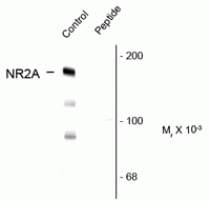ARG52361
anti-NMDAR2A phospho (Tyr1325) antibody
anti-NMDAR2A phospho (Tyr1325) antibody for Western blot and Mouse,Rat
Neuroscience antibody; Postsynaptic Receptor antibody
Overview
| Product Description | Rabbit Polyclonal antibody recognizes NMDAR2A phospho (Tyr1325) |
|---|---|
| Tested Reactivity | Ms, Rat |
| Tested Application | WB |
| Host | Rabbit |
| Clonality | Polyclonal |
| Isotype | IgG |
| Target Name | NMDAR2A |
| Antigen Species | Rat |
| Immunogen | Synthetic phospho-peptide corresponding to amino acid residues surrounding Tyr1325 conjugated to KLH |
| Conjugation | Un-conjugated |
| Alternate Names | FESD; NR2A; GluN2A; Glutamate receptor ionotropic, NMDA 2A; N-methyl D-aspartate receptor subtype 2A; EPND; Glutamate [NMDA] receptor subunit epsilon-1; NMDAR2A; LKS; hNR2A |
Application Instructions
| Application Suggestion |
|
||||
|---|---|---|---|---|---|
| Application Note | Specific for the ~180k NMDAR NR2A-subunit protein phosphorylated at Tyr1325 in Western blots. Immunolabeling is completely blocked by blocked by the phosphopeptide used as the antigen but not by the corresponding dephosphopeptide. * The dilutions indicate recommended starting dilutions and the optimal dilutions or concentrations should be determined by the scientist. |
Properties
| Form | Liquid |
|---|---|
| Purification | Affinity Purified |
| Buffer | 10 mM HEPES (pH 7.5), 150 mM NaCl, 0.1 mg/ml BSA and 50% Glycerol |
| Stabilizer | 0.1 mg/ml BSA, 50% Glycerol |
| Storage Instruction | For continuous use, store undiluted antibody at 2-8°C for up to a week. For long-term storage, aliquot and store at -20°C. Storage in frost free freezers is not recommended. Avoid repeated freeze/thaw cycles. Suggest spin the vial prior to opening. The antibody solution should be gently mixed before use. |
| Note | For laboratory research only, not for drug, diagnostic or other use. |
Bioinformation
| Database Links |
Swiss-port # P35436 Mouse Glutamate receptor ionotropic, NMDA 2A Swiss-port # Q00959 Rat Glutamate receptor ionotropic, NMDA 2A |
|---|---|
| Gene Symbol | GRIN2A |
| Gene Full Name | glutamate receptor, ionotropic, N-methyl D-aspartate 2A |
| Background | The ion channels activated by glutamate that are sensitive to N-methyl-Daspartate (NMDA) are designated NMDA receptors (NMDAR). The NMDAR plays an essential role in memory, neuronal development and it has also been implicated in several disorders of the central nervous system including Alzheimer’s, epilepsy and ischemic neuronal cell death (Grosshans et al., 2002; Wenthold et al., 2003; Carroll and Zukin, 2002). The NMDA receptor is also one of the principal molecular targets for alcohol in the CNS (Lovinger et al., 1989; Alvestad et al., 2003; Snell et al., 1996). Channels with physiological characteristics are produced when the NR1 subunit is combined with one or more of the NMDAR2 (NR2 A-D) subunits (Ishii et al., 1993). Recently, phosphorylation of Tyrosine 1325 of the NR2A subunit has been shown to be increased in human brain tissue sections from HIV-infected individuals with encephalitis (King et al., 2010). In addition, Tyr1325 phosphorylation has been linked with depression-related behavior (Taniguchi et al., 2009). |
| Research Area | Neuroscience antibody; Postsynaptic Receptor antibody |
| Calculated MW | 165 kDa |
Images (1) Click the Picture to Zoom In
-
ARG52361 anti-NMDAR2A phospho (Tyr1325) antibody WB image
Western blot: Rat hippocampal lysate showing specific immunolabeling of the ~180k NR2A subunit of the NMDAR phosphorylated at Tyr1325 (Control) stained with ARG52361 anti-NMDAR2A phospho (Tyr1325) antibody. The phosphospecificity of this labeling is shown in the second lane where immunoreactivity is blocked by preadsorption with the phospho-peptide (Peptide) used as antigen but not by the dephosphopeptide (not shown).






